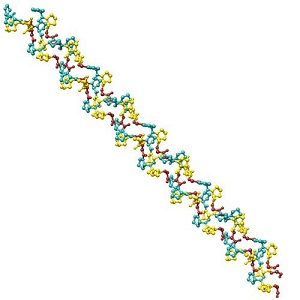
Elastin is a protein found in the body’s connective tissues, such as the skin, lungs, and blood vessels. It is an essential component of the extracellular matrix, which provides structural support and elasticity to the body’s tissues. It is responsible for the elasticity and recoil of tissues, allowing them to stretch and return to their original shape.
Elastin is crucial for the properly functioning of many organs, including the heart, lungs, and skin. In the skin, elastin fibers maintain the skin’s elasticity and prevent sagging and wrinkles. As we age, elastin production decreases, leading to a loss of elasticity in the skin.
It is often compared to another important protein in the body, collagen. While both elastin and collagen are essential for maintaining healthy tissues, they have different functions and structures. Collagen provides tissue strength and support, while elastin provides elasticity and recoil.

Understanding the differences between elastin and collagen is important for understanding how they work together to maintain healthy tissues and prevent aging. This blog post will explore elastin in more detail, including its structure, functions, and how it differs from collagen.
What is Elastin?
It is a fibrous protein composed of amino acids, including glycine, alanine, and proline. It is rich in non-polar amino acids, making it highly hydrophobic and water-resistant. Elastin is cross-linked with other elastin molecules through desmosine and isodesmosine, which creates a three-dimensional network of fibers.
- Functions of elastin in the body
It is essential for the proper functioning of many organs in the body. It provides elasticity and recoil to tissues, allowing them to stretch and return to their original shape, and it is found in many tissues, including the skin, lungs, blood vessels, and heart.
In the lungs, it allows the alveoli to expand and contract during breathing, ensuring proper oxygen exchange. In the blood vessels, elastin provides the necessary flexibility and elasticity to accommodate blood flow and pressure changes. In the heart, elastin helps the heart muscle contract and relax properly.
- Importance of elastin in skin elasticity
In the skin, elastin maintains the skin’s elasticity and prevents sagging and wrinkles. Elastin fibers are present in the dermis, the middle layer of the skin, providing support and structure to the skin. It allows the skin to stretch and move without tearing, and then return to its original shape.
As we age, elastin production decreases, leading to a loss of elasticity in the skin. This results in the development of wrinkles, sagging skin, and other signs of aging. Therefore, maintaining healthy levels of elastin is crucial for maintaining youthful-looking skin.
What is Collagen?
- Chemical structure and composition of collagen

Collagen is another important fibrous protein found in the body. It is the most abundant protein in the body. It primarily comprises the amino acids’ glycine, proline, and hydroxyproline. Collagen forms a triple helix structure, which provides strength and support to tissues.
- Functions of collagen in the body
Collagen is found in many tissues, including bone, cartilage, and tendons. It strengthens and supports these tissues, allowing them to resist stretching and tearing. Collagen is also essential for maintaining the structure and integrity of the skin.
In addition to its structural role, collagen is also important for wound healing. It forms the foundation for new tissue growth and helps to repair damaged tissues.
- Importance of collagen in skin health
Collagen is an essential component of the extracellular matrix in the skin. It provides strength and support to the skin, helping it to resist stretching and tearing. Collagen is also responsible for maintaining the skin’s texture and tone.
As we age, collagen production decreases, leading to a loss of elasticity and firmness in the skin. This results in the development of wrinkles, fine lines, and other signs of aging.
Collagen supplements and cosmetic treatments that stimulate collagen production are becoming increasingly popular as a way to maintain youthful-looking skin. However, it is important to note that the effectiveness of these treatments is still being studied, and more research is needed to fully understand their benefits.
The Difference Between Elastin and Collagen
- Structural differences
They have different structures that reflect their functions in the body. Elastin forms a highly cross-linked, three-dimensional network of fibers that are highly elastic and can stretch and recoil. Conversely, collagen forms a triple helix structure that provides tissue strength and support.
- Functional differences
The functions of them in the body also differ. Elastin provides elasticity and recoil to tissues, allowing them to stretch and return to their original shape. Collagen provides strength and support to tissues, helping them to resist stretching and tearing.
How they work together in the body
While they have different functions, they work together in many tissues to maintain healthy structure and function. For example, elastin provides the skin’s elasticity and recoil, while collagen provides the skin’s strength and support.
As we age, the production of them decreases, leading to a loss of elasticity and firmness in the skin. This results in the development of wrinkles, fine lines, and other signs of aging. Therefore, maintaining healthy levels of elastin and collagen is crucial for maintaining youthful-looking skin.
There are many ways to support the production of them in the body, such as eating a healthy diet, exercising regularly, and using natural skin care products that contain ingredients that support healthy production.

Elastin and Collagen in Skin Aging
As we age, the production of both decreases. This is due to genetics, environmental factors, and lifestyle choices such as diet and exercise.
They play a crucial role in skin aging. The loss of elastin leads to a loss of skin elasticity, resulting in sagging skin and wrinkles. The loss of collagen leads to a loss of skin firmness and tone, resulting in the appearance of fine lines and wrinkles.
Depletion of them in the skin can lead to a number of visible signs of aging, including wrinkles, sagging skin, and a loss of firmness and tone. The skin may also become thinner and more fragile, making it more susceptible to damage.
Factors that can accelerate the depletion of elastin and collagen in the skin include sun exposure, smoking, and a poor diet. Therefore, it is important to protect the skin from sun damage, quit smoking, and eat a healthy diet rich in nutrients that support skin health.
How to Boost Elastin and Collagen Production
Several lifestyle changes can help boost elastin and collagen production in the body. These include:
- Lifestyle changes that can help boost elastin and collagen production
- Protecting the skin from sun damage by wearing sunscreen and protective clothing
- Quitting smoking, as smoking can damage elastin and collagen fibers in the skin
- Eating a healthy diet rich in nutrients that support skin health, such as vitamin C, vitamin E, zinc, and copper
- Exercising regularly, as exercise, can help improve circulation and promote healthy skin
- Nutrients and supplements that can help boost elastin and collagen production
There are a number of nutrients and supplements that can help boost elastin and collagen production in the body. These include:

- Vitamin C, which is important for the synthesis of collagen in the body
- Vitamin E, which can help protect the skin from damage and support healthy collagen production
- Zinc and copper, which are essential cofactors for collagen synthesis in the body
- Collagen supplements can provide the body with the building blocks it needs to produce collagen
- Cosmetic treatments that can help boost elastin and collagen production
Several cosmetic treatments can help boost production of them in the skin. These include:
- Microneedling, which uses tiny needles to create small punctures in the skin, triggering the body’s natural healing response and stimulating collagen production
- Laser treatments can help stimulate collagen production and improve the appearance of fine lines and wrinkles.
- Chemical peels, which can help exfoliate the skin and stimulate collagen production
- Topical skincare products that contain ingredients that support collagen and elastin production, such as retinoids, peptides, and growth factors
conclusion
In conclusion, elastin and collagen are important proteins essential for maintaining healthy skin. Elastin is responsible for the skin’s elasticity, while collagen provides the skin with strength and firmness. Both proteins play important roles in preventing the visible signs of aging, such as wrinkles and sagging skin.
As we age, the production of elastin and collagen naturally declines. However, some steps can be taken to boost their production and support healthy skin. This includes making lifestyle changes, such as protecting the skin from sun damage, eating a healthy diet, and using cosmetic treatments and supplements that can help stimulate elastin and collagen production.
By supporting elastin and collagen production in the body, it is possible to maintain healthy, youthful-looking skin and prevent the visible signs of aging.




